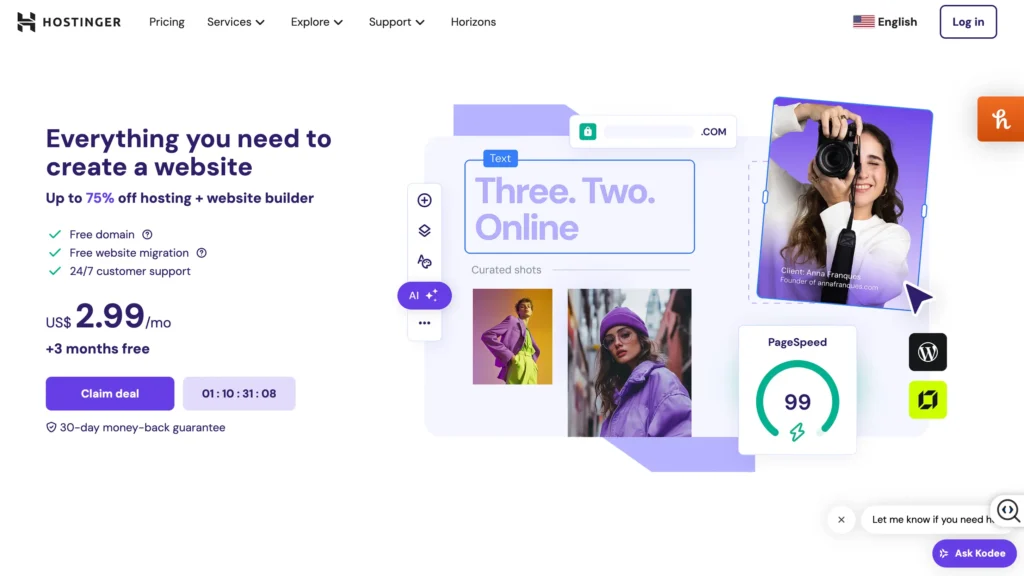Table of Content
Table of Contents
Are you ready to bring your website idea to life but feeling overwhelmed by all the web hosting options out there? You’re not alone. Choosing the best web hosting service can be the difference between a website that thrives and one that struggles to stay online.
In this comprehensive guide, I’ll walk you through everything you need to know about web hosting – from the basics to advanced considerations – and help you find the perfect hosting solution for your unique needs. After years of testing dozens of providers and helping thousands of clients launch successful websites, I’ve distilled all this knowledge into one ultimate resource.
What you’ll learn:
- What web hosting actually is (explained simply)
- The different types of web hosting and who they’re best for
- Critical factors to consider when choosing a host
- My top recommendations for different needs and budgets
- Common mistakes to avoid
- How to get started with your chosen host
Let’s dive in and find the best web hosting solution for your website!
What is Web Hosting and Why You Need the Best Web Hosting
Imagine you’ve built a beautiful house – that’s your website. Now you need land for that house to stand on and utilities to make it functional. That’s what web hosting provides.
Web hosting is a service that allows you to publish your website on the internet. When you purchase hosting, you’re essentially renting space on a physical server where all your website’s files, images, and data are stored. This server is connected to the internet 24/7, making your website accessible to visitors around the clock.
Here’s a simple analogy: If your website is a retail store, web hosting is:
- The physical building that houses your store
- The electricity that keeps the lights on
- The security system that protects your inventory
- The infrastructure that allows customers to enter and browse
Without web hosting, your website simply can’t exist online. Even the most beautifully designed site needs a reliable hosting service to be accessible to your audience.
Types of Web Hosting Explained (with Pros & Cons)
When researching the best web hosting providers, you’ll come across many different types. Understanding these options is critical for making the right choice for your website’s needs. Let’s explore the main types of hosting services, including where to find the best cheap web hosting options:
1. Shared Hosting
What it is: Your website shares server resources with many other websites.
Who it’s for: Beginners, small websites, blogs, and small businesses with limited traffic.
Pros:
- Most affordable option (typically $3-10/month)
- Easy to set up and manage
- Usually includes user-friendly control panels
- Perfect for beginners looking for the easiest web hosting
Cons:
- Limited resources can slow your site during traffic spikes
- Less control over server configuration
- Potential security vulnerabilities from neighboring sites
- Not suitable for high-traffic websites
Our top pick for shared hosting: Bluehost (more on this later)
2. VPS (Virtual Private Server) Hosting
What it is: A physical server divided into multiple virtual servers, each with dedicated resources.
Who it’s for: Growing websites, small to medium businesses, developers needing more control.
Pros:
- Dedicated resources (RAM, CPU)
- Better performance and reliability than shared hosting
- More control over server environment
- Room to scale as your site grows
Cons:
- More expensive than shared hosting ($20-80/month)
- Requires more technical knowledge
- Management responsibility falls on you (unless managed)
3. Dedicated Server Hosting
What it is: An entire physical server exclusively for your website.
Who it’s for: Large businesses, high-traffic websites, applications with specific requirements.
Pros:
- Maximum performance and reliability
- Complete control over server configuration
- Enhanced security and privacy
- All resources dedicated to your site alone
Cons:
- Most expensive option ($80-500+/month)
- Requires significant technical expertise
- Maintenance responsibility falls on you
4. Cloud Hosting
What it is: Your website is hosted across a network of connected virtual and physical servers.
Who it’s for: Websites with variable traffic, businesses needing scalability, growing online stores.
Pros:
- Excellent scalability (resources can be added instantly)
- High reliability with redundant servers
- Pay-as-you-go pricing options
- Better uptime guarantees
Cons:
- Can be more expensive than shared hosting
- Pricing can be unpredictable with resource spikes
- May require technical knowledge to optimize
5. Managed WordPress Hosting
What it is: Specialized hosting optimized specifically for WordPress websites.
Who it’s for: WordPress website owners who want performance without technical hassle.
Pros:
- Optimized specifically for WordPress
- Automatic WordPress updates and backups
- Enhanced security features for WordPress
- Expert WordPress support
Cons:
- Higher price than standard shared hosting
- Limited to WordPress only
- Restrictions on certain plugins (for security/performance)
6. Website Builder Hosting
What it is: All-in-one solutions like Wix or Shopify that combine hosting with site-building tools.
Who it’s for: Complete beginners, small businesses wanting simple solutions, those without technical skills.
Pros:
- Extremely user-friendly with drag-and-drop builders
- No technical skills required
- All-in-one solution (hosting, domain, builder)
- Often includes templates and design assistance
Cons:
- Limited customization options
- Higher long-term costs
- Difficult to migrate away from these platforms
- Less control over your website
7. Reseller Hosting
What it is: Allows you to sell hosting space to others under your own brand.
Who it’s for: Web designers, developers, or agencies who want to offer hosting to clients.
Pros:
- Create multiple hosting accounts for different clients
- Set your own pricing and profit margins
- White-label solutions available
- Good for bundling with other services
Cons:
- Requires business and technical knowledge
- Customer support responsibilities
- Initial investment needed
Key Factors to Consider When Choosing a Host
With so many options available, how do you pick the right one? Here are the critical factors you should evaluate:
1. Performance (Speed & Uptime)
Why it matters: Site speed affects user experience, conversion rates, and search rankings. A 1-second delay in page load can reduce conversions by 7%.
What to look for:
- Uptime guarantees (99.9% or higher)
- Server response times under 200ms
- SSD storage (faster than traditional HDD)
- Content Delivery Network (CDN) integration
- PHP 8.0+ support
- Server locations near your target audience
Our testing methodology: We set up identical test sites on different providers and monitor them over 90 days using tools like Pingdom, GTmetrix, and LoadImpact to measure response times, load speeds, and performance under traffic.
2. Security Features
Why it matters: Security breaches can devastate your website and business reputation.
What to look for:
- Free SSL certificates
- Regular automated backups
- Malware scanning and removal
- Web Application Firewall (WAF)
- DDoS protection
- Secure FTP access
- Regular security patches and updates
3. Customer Support
Why it matters: When issues arise, quality support can mean the difference between minor inconvenience and major downtime.
What to look for:
- 24/7 availability
- Multiple support channels (live chat, phone, email)
- Knowledgeable staff (not just reading from scripts)
- Comprehensive knowledge base and tutorials
- Response time guarantees
How we assess this: We test each provider’s support channels at different times of day, measuring response times and evaluating the quality and helpfulness of responses.
4. Ease of Use
Why it matters: A complex hosting environment can waste time and cause frustration, especially for beginners.
What to look for:
- Intuitive control panel (cPanel, Plesk, or custom)
- One-click installers for popular applications
- Website migration assistance
- User-friendly account management
- Clear navigation and documentation
5. Scalability
Why it matters: As your website grows, your hosting needs will change. Your host should grow with you.
What to look for:
- Easy upgrades between plans
- Ability to add resources without migration
- Clear upgrade paths
- No downtime during scaling
- Fair pricing on upgrades
6. Pricing & Value
Why it matters: The cheapest option isn’t always the best value, and hidden costs can add up quickly.
What to look for:
- Transparent pricing structure
- Clear information about renewal rates
- Included features vs. add-ons
- Money-back guarantee period
- Domain registration inclusion
- Free migration services
7. Specific Needs
Why it matters: Different websites have unique requirements that generic hosting may not address.
Consider these special requirements:
- WordPress optimization (if using WordPress)
- E-commerce capabilities (SSL, payment processing)
- Developer tools (Git, SSH, staging environments)
- Email hosting inclusion
- Database options and limitations
- Programming language support
Our Top Web Hosting Recommendations for 2025
After extensive testing and real-world experience, here are my top recommendations for different needs:
Best Overall Web Host: Bluehost

Bluehost consistently delivers excellent performance, reliability, and value across all important metrics, making it our top overall recommendation for most users.
Why Bluehost stands out:
- Exceptional uptime (99.98% in our long-term testing)
- Officially recommended by WordPress.org
- Outstanding beginner-friendly features
- Comprehensive security package included
- Excellent customer support (24/7 via phone, chat, and email)
- Free domain for the first year
- Free SSL certificate
Perfect for: First-time website owners, bloggers, small businesses, and WordPress users.
Pricing: Starting at $2.95/month (with occasional promotions)
What we love: Bluehost offers the perfect balance of performance, features, and price. Their onboarding process is incredibly smooth, making it the easiest web hosting for beginners to get started with. The intuitive control panel puts everything at your fingertips, and their WordPress integration is seamless.
If you’re ready to start your website with the best overall hosting provider, click here to visit Bluehost and get started today.
Want to learn how to build your site once you’ve secured hosting?
Check out my detailed guide: How to Start a Blog in 2025 (From Zero to Launch)
Best Budget-Friendly Web Host: Hostinger

Why it stands out:
- Incredibly affordable long-term plans
- Better performance than most budget hosts
- User-friendly custom control panel
- Weekly backups included
- Good customer support
Perfect for: Budget-conscious beginners, students, personal projects, and small blogs.
Pricing: Starting at $1.99/month (with long-term commitment)
What we love: Hostinger proves that best cheap web hosting doesn’t have to mean poor quality. Their custom-built control panel is actually more intuitive than many premium hosts.
Best for WordPress: WP Engine

Why it stands out:
- Purpose-built for WordPress
- Managed updates and security
- Staging environments
- Advanced caching and optimization
- WordPress-specific expert support
Perfect for: Professional WordPress sites, high-traffic blogs, and business sites running on WordPress.
Pricing: Starting at $25/month
What we love: WP Engine’s focus on WordPress means every aspect of their service is optimized for the platform, resulting in significantly faster load times and better security than generic hosts.
Best for Small Businesses: SiteGround

Why it stands out:
- Excellent performance metrics
- Free site migration
- Built-in advanced caching
- Superb customer service
- Daily backups
Perfect for: Growing small businesses, professional services, and content-focused websites.
Pricing: Starting at $3.99/month (promotional price)
What we love: SiteGround’s attention to performance and security gives small businesses enterprise-level features at an affordable price point.
Best for E-commerce: Nexcess

Why it stands out:
- Specialized WooCommerce and Magento hosting
- PCI compliance built-in
- Auto-scaling during traffic spikes
- 30-day backup retention
- Performance optimization for online stores
Perfect for: Online stores of all sizes, especially those using WooCommerce or Magento.
Pricing: Starting at $19/month
What we love: Nexcess understands the unique needs of e-commerce sites and has built their entire infrastructure to support them. The auto-scaling during sales or traffic spikes is invaluable.
Best for Developers: Kinsta

Why it stands out:
- Google Cloud Platform infrastructure
- Git integration
- Staging environments
- SSH and WP-CLI access
- Excellent performance metrics
Perfect for: Developers, agencies, and technical users building sophisticated websites.
Pricing: Starting at $35/month
What we love: Kinsta provides the perfect balance of developer tools and managed services, allowing for custom solutions without the overhead of server management.
Our Testing & Review Methodology
Our recommendations aren’t just opinions – they’re based on rigorous testing and real-world usage. Here’s how we evaluate each host:
- Performance Testing:
- We set up identical WordPress sites on each host
- Monitor uptime over 3 months using UptimeRobot
- Run speed tests from multiple global locations using GTmetrix and Pingdom
- Test performance under load using K6 (formerly LoadImpact)
- Security Assessment:
- Evaluate included security features
- Test vulnerability scans
- Review backup systems and recovery options
- Analyze SSL implementation
- Support Evaluation:
- Contact support through all available channels
- Time response rates at different hours
- Assess technical knowledge of support staff
- Evaluate helpfulness and problem resolution
- Usability Testing:
- Complete full setup process
- Install common applications
- Perform routine maintenance tasks
- Navigate control panels and settings
- Value Analysis:
- Compare feature sets across price points
- Identify hidden costs and fees
- Evaluate renewal pricing
- Assess overall value proposition
This methodology ensures our recommendations are based on quantifiable metrics rather than subjective opinions.
Common Web Hosting Mistakes to Avoid
Even with the best information, it’s easy to make mistakes when choosing a web host. Here are some common pitfalls to avoid:
- Choosing solely based on price
The cheapest option often means compromised performance, security, or support. Consider the total cost of ownership, including the value of your time. - Ignoring renewal rates
Many hosts offer attractive introductory prices but significantly higher renewal rates. Always check what you’ll pay after the initial term. - Overlooking resource limitations
“Unlimited” plans often have hidden limitations in their terms of service. Understand what resources (CPU, RAM, inodes) are actually allocated to your account. - Skipping the research on uptime
A 99% uptime guarantee sounds good but actually means your site could be down for over 7 hours each month! Look for 99.9% or higher. - Not considering future growth
Your hosting needs will change as your site grows. Choose a provider that offers clear upgrade paths without complicated migrations. - Overlooking backup solutions
Never rely solely on your host’s backup system. Ensure you have control over creating and downloading your own backups. - Ignoring geography
Server location impacts site speed. Choose a host with servers near your target audience or one with a global CDN.
Web Hosting FAQ
Web Hosting FAQ
How much should I expect to pay for good web hosting?
For shared hosting, expect to pay $3-10/month for quality service. VPS hosting typically runs $20-80/month, while dedicated servers start around $80/month and can exceed $500/month for high-performance options. Managed WordPress hosting generally costs $25-50/month for a small to medium site.
What’s the difference between domain registration and web hosting?
A domain is your website’s address (like yoursite.com), while hosting is where your website’s files actually live. Think of the domain as your street address and hosting as the physical building. Most hosting companies offer domain registration services, but they’re separate products.
Can I change web hosts later if I’m unhappy?
Yes, you can always migrate your website to a new host. The difficulty depends on your site’s size and complexity. Many hosts offer free migration services to make the transition easier.
Do I need a technical background to manage web hosting?
Not necessarily. Shared hosting and managed WordPress hosting are designed to be user-friendly for beginners. VPS and dedicated hosting generally require more technical knowledge or willingness to learn.
What’s the difference between managed and unmanaged hosting?
Managed hosting includes technical maintenance like updates, security patches, and backups handled by the host. Unmanaged hosting gives you full control but makes you responsible for all server maintenance and security.
What’s the best web hosting for WordPress sites?
For most WordPress users, I recommend Bluehost for its excellent WordPress integration, performance, and value. It’s recognized as one of the best web hosting options specifically optimized for WordPress. For higher-traffic WordPress sites, consider managed WordPress hosting from providers like WP Engine or Kinsta.
How does web hosting affect SEO?
The best web hosting services positively impact SEO through fast site speed, reliable uptime, and robust security. Quality hosting can improve user experience and search rankings. Server location can also affect loading speed for visitors in different regions, which is why the best web hosting providers offer multiple data centers or CDN integration.
How do I choose the best web hosting for my specific needs?
Look at your website’s requirements (expected traffic, features needed), technical comfort level, and budget. For most small to medium websites, Bluehost offers the best web hosting balance of features, performance, and price. If budget is your primary concern, look for the best cheap web hosting options like Hostinger that don’t compromise too much on quality.
Glossary of Web Hosting Terms
Bandwidth: The amount of data that can be transferred between your site and visitors in a given period.
cPanel: A popular control panel interface used to manage web hosting accounts.
DNS (Domain Name System): Translates domain names into IP addresses that computers use to identify each other.
FTP (File Transfer Protocol): A method for transferring files between your computer and your web hosting account.
IP Address: A unique numerical label assigned to each device on a computer network.
MySQL: A popular database management system used by many content management systems like WordPress.
PHP: A programming language commonly used for web development.
SSL Certificate: Creates an encrypted connection between your visitor’s browser and your website, securing data transfer.
Uptime: The percentage of time your website is available and operational.
WHOIS: A protocol used to query databases that store information about domain ownership.
Conclusion & Next Steps
Choosing the right web hosting provider is one of the most important decisions you’ll make for your website’s success. This guide has covered everything you need to know about finding the best web hosting for your specific needs. While there are many excellent options available, Bluehost stands out as our top recommendation for most users, especially beginners and small to medium businesses.
For those on a tight budget, the best cheap web hosting option is Hostinger, which offers quality service at very affordable rates. Remember that the best web hosting solution for you depends on your specific needs, technical comfort level, and budget. Take the time to assess these factors before making your decision.
Ready to take the next step?
- Determine your website’s needs and budget
- Choose the type of hosting that best matches those needs
- Select a reputable provider (I recommend Bluehost for most users)
- Sign up and set up your hosting account
- Install your preferred website platform (WordPress, etc.)
- Start building your website!
If you’re looking for a detailed guide on how to build your site once you’ve secured hosting, check out my step-by-step tutorial: How to Start a Blog in 2025 (From Zero to Launch)
Remember, your choice of web hosting forms the foundation of your online presence. Choose wisely, and you’ll set yourself up for long-term success!




